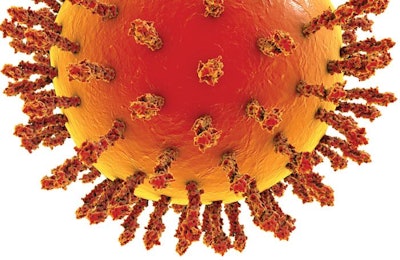
After an absence since April 2017, highly pathogenic avian influenza (HPAI) has returned to Afghanistan. Veterinary authorities there have confirmed to the World Organisation for Animal Health (OIE) that a highly pathogenic H5 virus was detected in two small poultry flocks near the capital, Kabul, this month. At the end of December, wild birds in the province of Khost tested positive for a similar virus.
A further six outbreaks of HPAI have occurred in Taiwan -- the latest in a three-year battle against the H5N2 virus in the poultry sector -- according to the latest OIE report. Latest to be affected were two flocks of meat ducks and of native chickens, as well as turkeys and laying hens. Locations include farms in the counties of Changhua, Pingtung, and Chiayi, and at a slaughterhouse in Taipei city. More than 46,000 birds were lost to the disease through mortality or destruction in these outbreaks alone.
More recent information from the Council of Agriculture includes two further outbreaks of HPAI in Changhua, and another in Tainan city, reports Focus Taiwan. More than 5,000 ducks were culled as a result. These latest cases brings Taiwan’s total to 19 outbreaks this year, and loss of almost 165,000 birds. Enhanced surveillance of Taiwan’s poultry is ongoing.
More biosecurity in South Korea
In South Korea, the number of confirmed outbreaks of HPAI since November 2017 has reached 16, with 1.78 million ducks and chickens culled in order to curb the spread of the disease, according to Yonhap. The H5N6 virus variant has been confirmed in a flock of 147,700 laying hens in South Jeolla province. A further 200,000 birds in nearby flocks will also be culled.
The Ministry of Agriculture has announced several measures to improve biosecurity in the poultry sector, reports Yonhap. Measures include a reduction in maximum stocking density on farms, and changes to planning rules so farms are at least 500 meters apart and three kilometers from sites frequented by migratory wild birds. Cameras will be set up to monitor biosecurity at 5,600 farms across the country and, from 2022, all live bird markets will be banned.
With the confirmation of two new HPAI outbreaks linked to the H5N8 virus, Iraq’s total outbreaks since the start of the year has increased to four. Latest to be affected were two farms in Baghdad with a total of 31,000 birds, all of which have been lost to the disease through mortality or destruction.
Europe: UK extends avian flu control zone
Mass mortality among wild birds at a third location in the United Kingdom has been reported to the OIE, leading the veterinary authorities to extend the Avian Influenza Prevention Zone to the whole of England and Wales. Nineteen birds belonging to the duck and gull families found dead at a nature reserve in the English county of Hertfordshire have tested positive for the same H5N6 variant of the HPAI virus as in the two previous outbreaks.
The same virus subtype has been detected in birds at three locations in the Netherlands in the past month. The Dutch animal health agency has reported to the OIE that a total of six wild birds found dead in villages in the provinces of Gelderland and North Holland have tested positive for the virus, as well as among a small backyard flock in South Holland.
Following HPAI outbreaks in wild birds linked to the H5N5 and H5N8 variants in 2017, Italy’s government department for veterinary public health has declared these events “resolved” to the OIE.
Africa: New outbreaks of HPAI in commercial ostriches
The number of H5N8 HPAI outbreaks in South Africa has risen to 123. According to the official report to the OIE, there were six cases among a total of 2,211 commercial ostriches at two farms in Western Cape Province during September and November 2017.
In Cape Town, wild members of the gull family found dead at four locations in the city during the last week of December have tested positive for HPAI viruses of the same family.

















